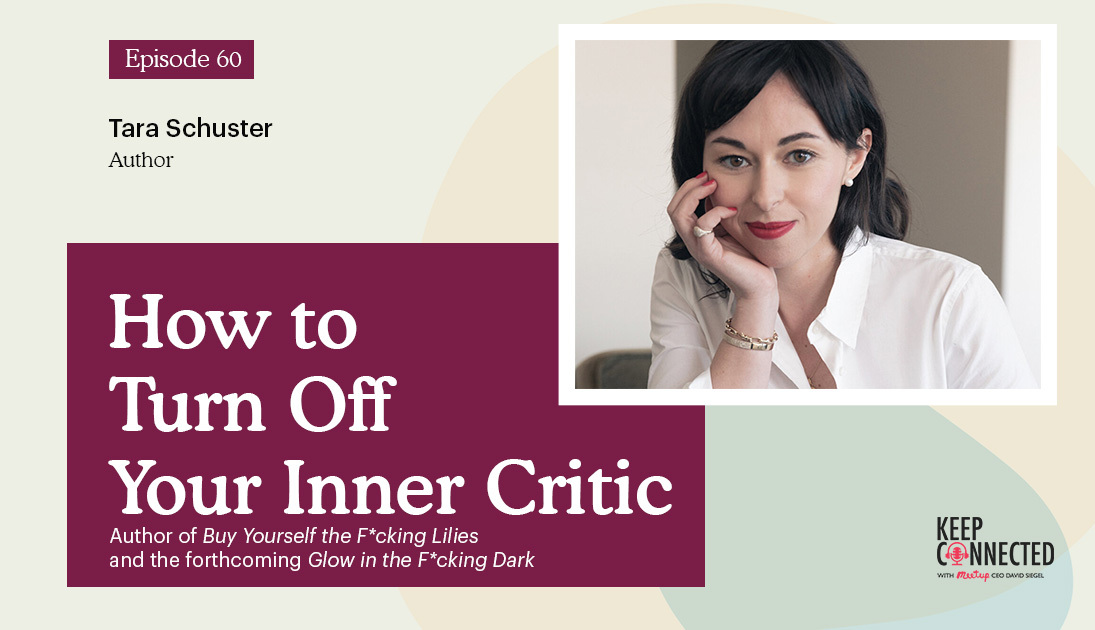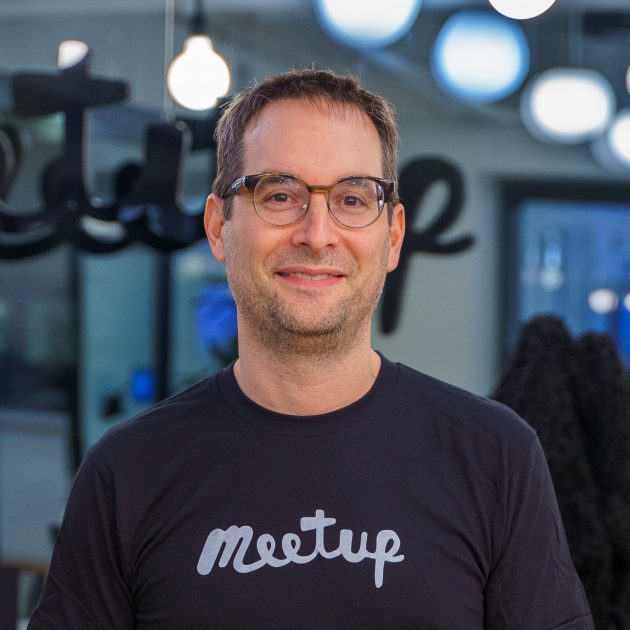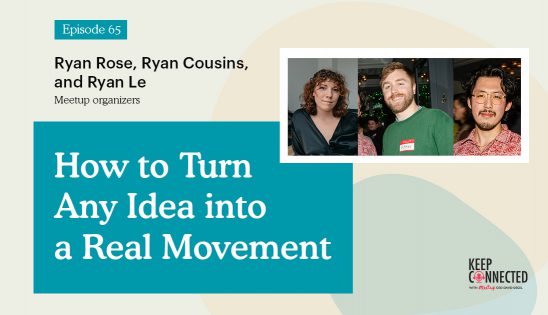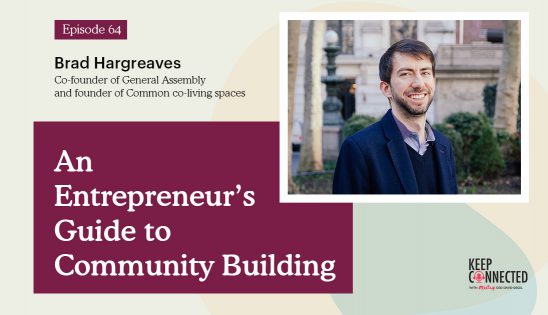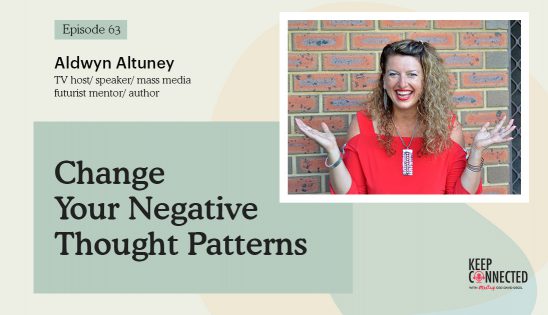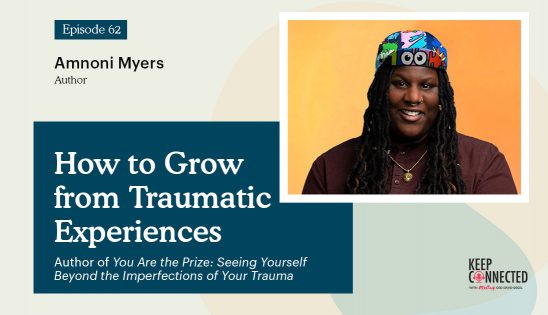Tara Schuster was Vice President of Talent and Development at Comedy Central, and much of her identity and self-esteem was founded on that Emmy and Peabody Award-winning work. But when she was laid off during the pandemic, a severe identity crisis followed. Now, Tara is the author of Buy Yourself the F*cking Lilies and the forthcoming Glow in the F*cking Dark, two nonfiction powerhouses that use Tara’s life story to explore universal truths about finding internal validation. She and David sit down to discuss “unlearning” negative behaviors rooted in childhood trauma, silencing your inner frenemy, the beauty of journaling in the morning, and more.
Show Notes
This is a special episode with bestselling author Tara Schuster. This is an individual who worked at Comedy Central and has also written the books Glow In The F*cking Dark and Buy Yourself The F*cking Lilies. It is not going to be all about F words, we promise. Happy reading and learning.
—
Tara, welcome to the show. You are f******* awesome.
Can you say hello to me all the time? That was the nicest hello I have ever heard. You are f****** awesome. Thank you for having me.
People might be wondering, “David never introduced, and says, ‘F****** awesome,’ to their guests. Why would he be saying that?” I say that because your previous bestseller is called Buy Yourself The F*cking Lilies and your soon-to-be bestseller, Glow in the F*cking Dark, takes lots of comfort in that word. You are an amazing person. I’m glad to have you. We will throw a couple of bombs around, but it will not be with this level of persistence.
Thank you for having me. I’m thrilled to talk to you. When we chatted before, I told you about how I had such a good experience with Meetup doing an event around emotional health during the holidays. Your team was awesome. I was like, “This is its own Meetup. It is preparing for this event.” They were thorough and kind. One woman, Janine, set me up with a whole other organization. It was cool. You have good peeps in your organization.
It is important because you can’t make the shoemaker’s children go barefoot. What I mean by that is Meetup is a kind organization. We focused on ending loneliness and mental health and helping introverts and people that don’t have a community. We look for that in our people. When we hire people, we make sure to prioritize kindness as part of the priority. I’m glad you experienced that, and hopefully, many others will.
Let’s talk about your story. You have written and talked a lot about having to reparent yourself. You are F-up your childhood. Share a little context for people and help people to understand the background story for our readers. I know this is going to be the absolute first time you have ever told that. Try to doze and have the enthusiasm of a first time.
This is the first time ever, despite two books that go into this. Not to total mood shift, but I grew up in a house where things came to die, the pets and animals. It was super neglectful and psychologically abusive. I don’t blame my parents for those circumstances. They were deeply traumatized people who did not have the capacity to learn how to take care of my sister and me. What I learned from that experience was the only way I was going to get attention from adults was to hustle for my worth, get good grades, get into an Ivy League college, and get the best job. Isn’t this job fancy? I ended up at Comedy Central, where I was an executive in charge of shows like Key and Peele, working with David Spade and all these fancy people.
You get to tell lots of people at cocktail parties, “I work for Comedy Central. I work for fancy people. I must be happy and emotionally healthy.”
I’m like, “I’m in Hollywood. This is glamorous and fancy.” I only realized everyone in my past knew that there was neglect going on. I felt good being able to say, “I’m the Vice President of Talent Development at Comedy Central. I made it. I’m not a weirdo. Aren’t you jealous?” My whole identity was tied up in that.
How much did you hide or neglect, and people didn’t know and would have been surprised, versus they looked at me like, “Poor Tara?”
No, none of that. It was completely hidden. What I know is you can’t completely hide that. It is weird when you are not inviting anybody to your house and don’t want them to meet your parents, where you are evading the truth constantly. I didn’t talk about any of this until Buy Yourself The F*cking Lilies came out. A lot of my friends were like, “That makes sense.”
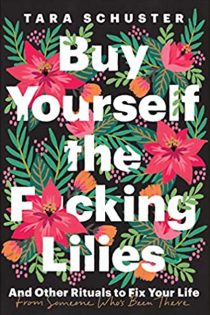
I was ashamed. I was using this high status, “I have a great job,” as my external validation. That is all I had. I might have kept going that way, looking good on the outside, being good at work but bad at life, except I was a mess. I was severely anxious and depressed. I don’t talk about it in the first book, but now I’m willing to. I was flirting with suicidal ideation constantly. It was inside of me. It was like sandpaper on the soul. It was rough and wrong. I felt 10 out of 10 anxious and I had a disc track playing in my head. All I could hear was, “You are a failure. You are never going to succeed. You are not lovable.”
All that, Tara, would have surprised the people around you, or at this point, you were not as good at hiding it.
I am the master of hiding my emotions. Nobody knew what was going on at all. I would show up to work as the straight-A, good daughter of the office, and loyal. I’m like, “Look at all these things I did. Isn’t this great?” I’m going to get extra credit by going to this leadership conference that nobody asked me to. It is over the top. It might have kept going that way. Had I not, on my 25th birthday, drunk out my therapist and threatened to hurt myself.
It is a particular shame when you wake up and realize that is what happened because I listened back to her voicemails. That is how I even knew. I looked at my phone and I was like, “Why is my doctor calling me? It is weird. What’s up, doc?” It is Saturday night. In her messages, she was getting increasingly worried about finding me, getting me to go to a hospital, and getting me to be with someone. It wasn’t until I heard the worry in her voice that I started worrying about myself. I thought, “If I don’t do something to save my life, there is not going to be much more of a life left for me.”
That morning, I was hungover. In my Forever 21 sequin number, I got serious. I said to myself, “I didn’t have parents. I don’t have anyone to nurture me, wise mentors, or a support system. I got to figure this out now.” It was with urgency. I decided, “I got to reparent myself.” That wasn’t a term when I started this project. I knew I needed to go back and unlearn so much. I had to unlearn a bunch. I knew that I had to learn a lot.
I started a Google Doc because I was such a worker bee. We do everything with a Google Doc, even mental health. I wrote all the questions I had, “What are values? What are principles? What are vegetables? What are they? Which ones should I be eating?” I still have that question. I feel like Instagram is always telling me. It is one thing. We should understand this better at this point in civilization. I did this for five years. In the end, I had a 600-page Google Doc and felt like a completely different person. I read a memoir as self-help. I sought out adults to teach me, people I respected and admired. It was a constant battle.
Your journey, as you describe it here, is incredibly self-initiated. Did you go to a facility, a hospital, or seek any more formal process for therapy aside from the therapist you are going to, or you chose your own adventure to a large extent in your way?
This is a mystery about me. I’m what the writer Gretchen Rubin would describe as an upholder, which means I’m always hustling for external validation, but I’m the one doing it. I don’t need encouragement.
It is very initiative-taking.
That is a gift my parents gave me. I’m sure that is part of their personality.
That is what they had to do to survive to some extent.
My little survivor voice is if I didn’t do everything I did to get out of that house and get myself tools for mental health, I wouldn’t be here now. It was all self-led. I found incredible mentors in the books of Nora Ephron and Steve Martin. I soaked up everything. At the end of five years, I felt stable for the first time, which emotional stability seemed impossible. Some days, I’m not worried and spiraling. That was a huge momentous achievement. That is when I realize, “I have a whole guidebook. I have 600 pages of this journey. I wonder if this would be helpful for anyone else.”
I would have a book like this when I was going through it. Buy Yourself The F*cking Lilies is an offering of, “You don’t need to have had as neglect full a childhood as I had.” We all have holes. Even the best of parents who nurtured this s*** out of you can’t do everything. They are humans. This book is for anybody who is looking to fill in some holes and learn how to self-nurture. That is what Buy Yourself The F*cking Lilies is all about. That is the briefest version of how I can talk about my backstory.
Every childhood experience has its holes. Even the best parents cannot do everything because they are only human.
Do you have a relationship with either of your parents now?
Yes. I have an extremely close relationship with my dad now. I had this Comedy Central job and that was my status. I got laid off at the beginning of the pandemic. With it, I had a complete identity crisis. People introduced me as Tara Schuster, Comedy Central. It was my married last name. That is who I was. When I lost that job and identity, all of my worst traumas, which I had suppressed, came bubbling to the surface because no one else was defining me. I didn’t have a schedule to be on and these things wanted to be dealt with.
You define yourself by external versus internal. That is the problem with losing the external.
I wondered, “Do we have an essential self? Is there something more?” I had realized much of my life had been a reaction to trauma, not a proactive decision about who I am. One of the things I did was I stopped talking to my dad. I hadn’t talked to my mom for several years. I don’t have any relationship with my mom. I realized I love my dad. I need space. If I’m going to heal these darkest wounds, I cannot have him on my mind. I had taken care of his emotions for so long. I can’t do this.
I stopped talking to him. He got COVID. I found this out from my sister. I thought, “It doesn’t matter. I’m going to help him.” When I went to help him, I found out the craziest thing of all, which was he had gone to therapy every week of those few years to answer the question, “Why is my daughter not speaking to me?” I’m not exaggerating at all. He is 180% different. He thanked me if I helped him through COVID.
How old was your dad at that time?
He was 78.
That is a message that I want our readers to read, which is people oftentimes think of therapy for teenagers. They were like, “I’m figuring out life. I don’t know what to do.” To have that transformation at 78 years old and be 180 degrees different person in the ways that you want to be different, I find that incredibly motivating as someone who is a middle-aged person, but I’m not quite 78 myself. It is important for people to realize that.
The reason I tell that story is I don’t want that story interpreted as if you set a boundary, someone will change. That is rarely the case. Boundary setting is important. The point of even sharing a detail like that is that we all have more agency than we think. There isn’t a moment when it is too late. If you were to talk to my dad now, he would say that it was painful for him, and he is glad that I stopped talking to him because, as I write about in this book, he feels like a human for the first time. He feels like he is going to get to live a life. There is a sorrow to me of like, “I have a dad for the first time. Why couldn’t it have been like this much sooner?” It takes time it takes.
For a lot of people, it never happens. However many years he has left is a gift. It will be a gift to you too. You talk regularly now. You talk about your books and the past. He must be beyond proud of you.
He is very proud. People get afraid of honesty. If we talk about this, it is going to be worse. I don’t want to talk about this. What I learned through this whole journey is it was the secrecy that was rotting everything. Once I had the books, my dad, on paper, could validate. He was like, “Everything in here happened. I’m sorry.” It forced him to look at the situation more objectively. From my eyes, how that would’ve felt. If anything, our relationship is millions of times better than it ever was. I would write the books all over again simply to be closer to my dad.
You wrote your next book, Glow in the F*cking Dark. There is a f*cking series going on here.
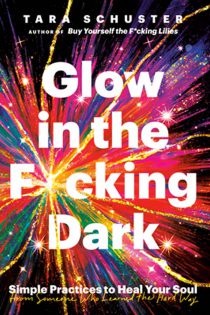
When I lost the job, I did not take a moment to reflect. I didn’t say, “I’m well-resourced. I can take two seconds and think about this.” I thought, “I need meaning now. I need to be busy now.” How I dealt with everything was hustle, produce, and make.
As long as you don’t have to think, it is always easier. If you are doing lots of stuff, you don’t have to think. That works.
That job had been full-time, 24-hour. I’m passionate about this job. I needed something to replace it. It was 2020. I googled, “How can I help in the 2020 election?” I was like, “This is a big deal. This is what I will do.” The first search result was, “You can help register voters in Arizona.” I grabbed my Vitamix and a bag full of books that I would never read. I hopped in my Prius of Doom, and I moved to Arizona.
En route, somewhere in the Mojave Desert between Los Angeles and Flagstaff, I had a full-body dissociative episode. If you haven’t had one, it’s your mind is trying to shut down any traumatic memories and anything you don’t want to think about. It represses, but it makes your body feel like it is not present. You don’t feel present.
I could see my hands on the steering wheel and my shoddy self-done manicure, but it was like they were floating and they weren’t mine. I felt full-body sick. All of my insights could come up. I also felt out of control. I was going 95 and having trouble thinking how to stop. If you know me, I’m not a good enough driver to be going 95 anywhere, much less in the middle of the desert having this episode. For the first time in my life, I realized, “I have to pull over. I cannot keep hustling and overwhelming my way through life. This doesn’t work. It feels awful. Now I’m endangering my own life.”
If you keep on hustling and overwhelming your way through life, you are only endangering yourself.
Pulling over wasn’t physically pulling over it. It is metaphorically pulling over.
It is like my soul got to rest. I could not keep doing this. I pulled over. It was nighttime. In the Arizona desert, it looked like I was surrounded by a starfield. I was like glowing stars everywhere. Maybe that is because, in LA, we have so much pollution that you are like, “That is a star.” Someone was like, “No, it is a satellite. There are no stars.” I was standing there looking at these, and I wondered, “It is dark out here.” In 2020, it was such a dark world at this moment. I got no control over that. Is there a place within me that can glow as these stars do?
What is interesting is that stars glow due to stress and pressure. Stress and pressure are good for creating glowing. It is similar to us humans. I listened to something on a podcast. They talked about the importance of having small negatives, pressures, and stress to avoid big negatives, pressures, and stress. Pressure and stress are positive things because it moves you in the right direction as long as it is something that you can handle.
It is unavoidable. Good or bad, you are going to be stressed and pressured. It is going to happen over and over again. You have no control. The only question here is, how do you find internal safety? How do you stop being moved by the wind every time there is a gust? That is all we have control over.
One of the things that I read about that you write and read about, which I thought was well said, is about silencing your inner front me and shielding yourself from self-criticism and the importance of it. It is important. I want to pull it out. Can you talk a little bit more about that because everyone suffers from this to varying degrees? Help us understand it a little more.
I was addicted to self-criticism. All I could hear was this running disc track which was grinding me down because it is hard to dream, live or be happy if you are that negative about yourself. I knew that was happening. One of the first tools I was ever introduced to is journaling as a way to even see what was going on in my interior. I’m sorry to say this, but I have been journaling for more than a decade now, and it works more than anything.
Why are you sorry to say this?
It is because it is annoying. Who wants to journal? It is terrible.
Do you handwrite your journaling?
Yes.
Is it a different experience because I know you talk about journaling a lot, to write by hand versus to type? I was talking to a family member of mine. I said to her, “It is important to journal.” She was like, “I have never written anything in my life. I would type.” What is the advice here? Is typing okay or not?
Anything that gets you to journal is great. There is an added benefit to writing because your mind and body have to unite to do something physical. One of the most beautiful things about journaling is you get out of your mind and onto the page. How I do it is I word vomit three pages every morning, which is taken from Julia Cameron’s fabulous book The Artist’s Way.
It is without stopping and thinking.
You are not even writing. It’s more like you are venting. You are not reporting on what happened yesterday. You are asking yourself, “How do I feel?” It is something most of us do not take any time to think about nor know any of the vocabulary for. I was journaling all the time. I saw how little I thought of myself and how doomed I felt. That was mind-blowing to see that. What was great was, on the page, you can deal with those things.

I realized I have this voice within me. It is not quite my own voice. It is my friend and me within. It is somebody I have known forever, like an old camp friend, who I wouldn’t be friends with now. If we met, I would not want to hang out with them. We got history. I keep my friend of me within around. I needed to figure out how to let her be quiet a little bit more of the time.
What I did was I would write down everything she was saying about me. “Hear all the fiction,” she is saying about me. I would put a column down on a piece of paper. On the other side, I would write the facts, what else is true? Is it true that I’m going to be unloved, never find romantic love, and never have a partner, or is it true that I have so much love in my life? I have succeeded at everything I have ever tried once I put some effort into it. Why would this be any different? If I keep holding this attitude, aren’t I going to make things much worse? You are able to parse things out. Sometimes I would write a letter to my friend of me within, refuting all the charges and defending myself.
You would acknowledge the criticism first. It is not disregarding. It is acknowledging it, and not just acknowledging verbally but documenting it and finding ways to combat that criticism. Some of it would say, “That is true.” Some of it would say, “It is not true.” That was a way to understand which things to truly be self-critical about and which things, hopefully, in the majority of things, not to necessarily be and not to be as obsessed with.
One of the things you said at first is paramount, which is don’t dismiss these things. We often think, “I know intellectually that is not a real thing. I’m not going to deal with it.” The problem is we are not dealing with it. We are pushing it to the side. Whatever that little voice is, it wants to be heard. If you dismiss it, it is going to keep coming back tenfold because it wants you to hear something. I would take it a step further and say, “I realize you can’t reject your way to self-acceptance. You have to love those parts of yourself.”
You change a lot of things. You could harness it in the right way, but you can’t change who you are internally.
What I realized is those voices now work with me, not against me. It is unbelievably different for me how I walk around the world. I largely don’t criticize myself. I largely say, “I notice that. How interesting. Let me work with that feeling.” Through all these practices that I describe in my second book, like meditation, which I try to explain in a less annoying way than most people talk about meditation, journaling, or any of the practices, they give you more space within you. They are things that help you manage your emotions. You are less easily overwhelmed. It is not that I don’t get anxious anymore. I do. It is not the only thing. It doesn’t like to hook in and overwhelm.
When you do, you have a number of different actions that you can take. I was talking to a friend who gets anxious. What she does is she experiences all five of the senses and takes a pause. It grounds her. Everyone experiences some level of anxiety. It is a question of how you handle that anxiety when you are getting it.
You talked a little bit about meditation and journaling. One of the things you write quite a bit about is the morning time and once practice in the morning. I’m a big morning person. Not everyone is as lucky as me to love the morning. Part of it is that I want to get as many things as I can that are important to be done during the day. I know that if I get them done in the morning, I don’t have to worry about and think about whether I’m going to be able to get them done in the evening and have that stress. Talk a little bit about your mornings. What do they look like? What do you want them to look like?
I have another apology. I’m sorry that it works to be a morning person. No one is more sorry than I am. I hated the mornings. I’m going to comedy shows for my job. I’m not getting home until 1:00 or 2:00 in the morning.
Comedy writers were not known to wake up at 5:00 AM and go to sleep by 10:00.
I realized, “I have priorities that have nothing to do with my job or who I am externally. If I don’t do them in the morning, they are not going to get done because the world takes its toll. The world demands things of you, your partner, your kids, and your boss.” For me, what my mornings look like is I wake up at 6:30 every morning. The first thing I do is meditate for 20 to 30 minutes. A good way to begin is to be grounded and chill for a minute or at least alone, but conscious for one minute. Let’s do that. I journal for about an hour. It is 20 minutes of journaling and 40 minutes of writing. Twenty minutes would be great. It is word vomiting and then I exercise.
You haven’t eaten anything yet, no coffee.
I’m on an intermittent fasting schedule. I would have coffee if I were to even get more granular. I get out of bed, put the blinds down, and brush my teeth. It is a whole order. One thing follows the next.
People say to me, “My mornings are like groundhog day.” If you looked at my morning, especially in the last several years since COVID started, where it got consistent, it was like, go downstairs, make my athletic greens, drink my athletic greens, and empty the dishwasher. It is one after another. It is consistent.
My schedule is boring, which means I can be creative and risky in other parts of my life because I feel secure and grounded in those things. Creatively, I’m not scared anymore.
I love that for people whose every day they wake up and think, “What am I going to do now? That is scary.”
It is soothing to have a ritual like that. The other big thing is I don’t look at my phone for the first hour that I’m conscious. It is a game changer. Until you start doing it, you are like, “My life is immeasurably better because I didn’t get sucked down on Instagram or doom spiral. I wasn’t looking at a screen. First thing I was with me. If you wanted to jumpstart your whole self-care routine, you would sleep with the phone, not in your room. You would not look at it for the first hour you are awake. It is horrible and terrible part.
My wife does not let us have our phones in our room and guest room. We keep it outside. It is a little more difficult because I like to look at my little morning newsletters while I have my breakfast, but I’m going to see if it is possible. I love that morning ritual. That is amazing. Many people can learn from it. They don’t need to copy what you do. They need to figure out what the right thing is for them, and they can be inspired by some of the things that you do. Having a ritual is helpful.
I have many questions. I saw that you know Glennon and you have done some things with her together. Everyone talks about bearing it all. You were someone who didn’t share nearly anything about yourself. There are many people who are reading who also are in a similar place. Brené Brown shares it all. They also hadn’t shared much at various times in their life. How hard was it for you in the beginning? Is it harder than you thought it would be or easier than you thought it would be?
It wasn’t hard at all. It shocked me. I often wonder what is wrong with me. People would ask me this question, “How hard is it? You are vulnerable on the page. You are telling everybody everything.” I’m like, “This wasn’t normal. I should be scared. What?” What freaked me out was I didn’t even realize to be scared about it. It felt natural. What I would say is something I learned from Glennon Doyle, which is, “The stories that we are telling are not that personal.” I only will write a story if it feels like there is a universal truth. I’m using my details. You can see it through my eyes and maybe it resonates, but there are things that everybody can relate to. They feel different when I write them. If it is too personal and about me and it is not healed, I can tell. It is a weird, different vibration to the writing.
It is not something people can gain and learn from.
I only write something if I’m interested in it and it would be helpful to other people. Those are the two questions I always ask. If it is something else like I’m ranting, venting, or I’m like, “This happened, and I need to figure it out on paper,” that is not something I would include in a book.
It is healthy still to do.
There is a difference between my own journal and writing. One is deeply personal. The other is I’m using personal stories to tell a universal truth.
I have to ask it because I’m wondering, based on the way that you were parented and your unparenting experiences, do you want to have kids?
I am ambivalent about if I want to have kids or not. I write in Glow about my own. I didn’t know what I wanted. I was 35. A lot of 35-year-old women around me are like, “You should freeze your eggs. Give yourself more options.” I was completely ambivalent. I’m like, “I don’t know.” Enough people said it that I thought, “For the future me who has a better understanding of all of this and who is more healed, she might want more options. Since I don’t know, let me do this.” I had an expiring insurance benefit and I love a deal.
It is expensive.
I knew I was going to get a steep discount. I cannot resist.
Some people like to go discount shopping and you like to go to discount healthcare.
I did freeze my eggs and go through. It was a terrible process that I want to tell people about, and I do it in the book because I don’t know if I want to have kids. I have no clue.
You are a different person in your mid-late 30s than you were in your early 20s and you were in your early teens. You could be a different person in your early to mid-40s than you are now. Creating that option for yourself is prudent. It is good that you got the discount. It is a potentially great name to name your kid if it happens. Rapid-fire questions and rapid-fire answers. Are you ready?
I think so. Let’s try.
The first time you saw yourself as a leader.
At Comedy Central, when I started having meetings that people would come up to me and say, “That wasn’t miserable. Thanks for calling me out. Thanks for the praise.” I was like, “I’m changing our culture a little at this office.”
If you could access a time machine and go anywhere in the world at any time, where and when are you going?
I would go to New York in the Upper West Side in the 1990s to meet Nora Ephron and have coffee, rugelach, or something like that with her. She is my favorite author, director, and icon. There is a picture of her above my computer, staring at me at all times. I would like to meet her to hear her talk. I don’t even know that I have questions. I want to hear her opinion on everything.
Chocolate or strawberry rugelach?
Chocolate.
No cinnamon or strawberry food. Our readers are like, “What is rugelach?” Look it up. You could Google it if you are outside the US. Name one thing on your bucket list.
I want to go to Patagonia. I have been to Buenos Aires. It took a long solo vacation there, but I wasn’t brave enough to go to Patagonia, and now I’m like, “I got to get there.”
Do you want to see the penguins?
I want to see everything.
It is supposed to be incredibly beautiful. I have not been myself, but one day we will go together. Last questions. You have done many things. You are not even halfway done. Your third is done with your life. What do you most want to be remembered by?
I want to be remembered that people felt like they were seen, they felt special when I talked to them, and that I was present with people. That is what I want to be remembered for.
I felt that you were present in the conversation. Thank you for taking the time to be on the show. I feel connected to you. Hopefully, many of our readers feel the same.
Thank you for having me. This was fabulous.
—
Thanks for tuning in with Tara Schuster as our guest. What an exceptional individual. Some takeaways. The power of the morning ritual, whether it is meditation, exercise, and yoga. Not listening and interacting with social media is powerful. Her identification is not as her job or externalities but with an understanding of who she truly is and the importance of internal safety versus self-criticism. If you enjoy this episode, subscribe, leave a review, and let’s keep connected because life is better together.
Important Links
Last modified on April 12, 2023

